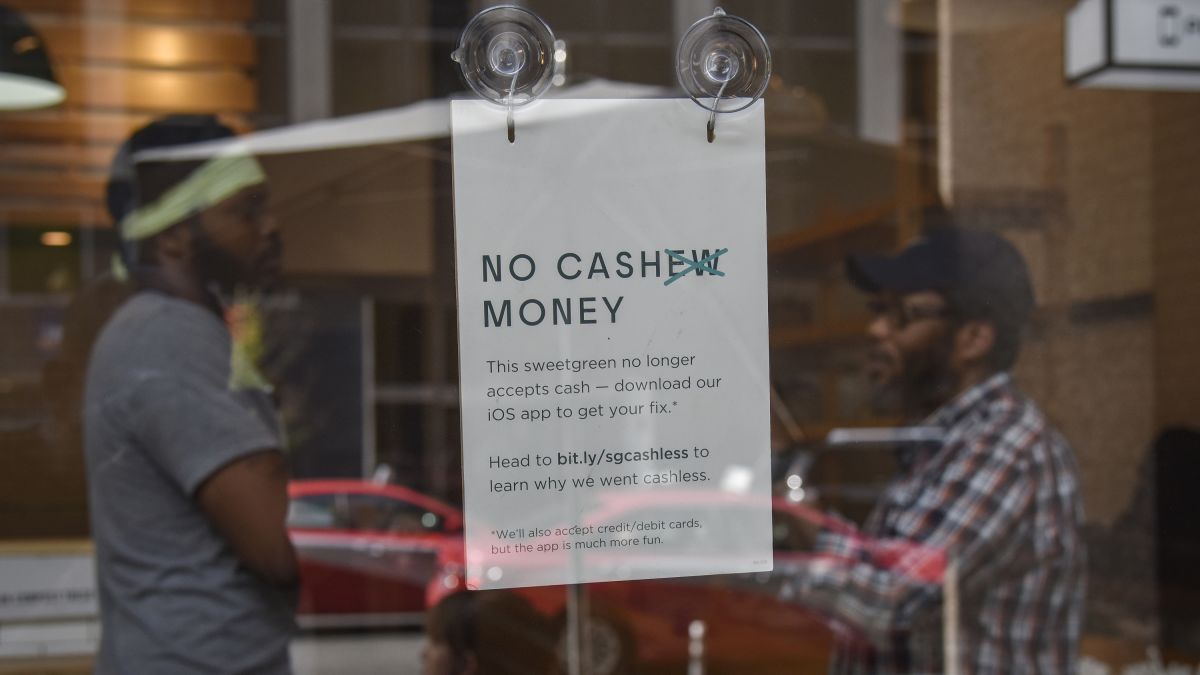Costly for the Poor and Marginalized
A cashless society may seem like a convenient and modern concept, but it can have adverse effects on certain segments of the population, particularly the poor and marginalized. While digital transactions offer ease and efficiency, they often come with hidden costs that disproportionately impact those who are already financially disadvantaged.
One of the main concerns is the access to and affordability of digital payment methods. Many low-income individuals do not have access to smartphones or bank accounts, which are essential for participating in a cashless economy. The cost of purchasing and maintaining these devices can be a significant barrier to entry. In addition, accessing the internet and data can be expensive, making it challenging for financially-strapped individuals to connect and make secure online transactions.
Moreover, cashless transactions often carry transaction fees and charges, such as service fees, bank charges, or convenience fees for using digital payment platforms. These fees can quickly add up and eat into the limited budgets of the poor. In a cash-based economy, the exchange of physical cash does not incur any additional costs, making it a more affordable option for those with limited financial means.
Another concern is the reliance on technology. In a cashless society, individuals must rely heavily on digital infrastructure, such as payment processors and online banking systems. However, these systems are not always reliable, and technical glitches or cyberattacks can disrupt the smooth functioning of digital transactions. When vulnerable individuals rely solely on digital payments, they are left without any alternatives if these systems fail. This vulnerability can lead to financial hardship and further exclusion.
Furthermore, the lack of financial literacy and digital skills among the poor and marginalized can make it difficult for them to navigate the complexities of a cashless society. Many individuals in this group may not possess the necessary knowledge to use digital payment platforms effectively, which leaves them at a disadvantage. This can result in a cycle of financial exclusion, where those who are already marginalized are further marginalized in a cashless economy.
In summary, while a cashless society may offer convenience for some, it has the potential to deepen the financial divide for the poor and marginalized. The costs associated with digital transactions, the reliance on technology, and the lack of financial literacy all contribute to further exclusion and financial hardships for this vulnerable population. It is crucial that we address these concerns and ensure that any transition to a cashless society is inclusive and takes into account the needs of all individuals, regardless of their socioeconomic status.
Increased Vulnerability to Cyberattacks and Technological Glitches
As our society becomes increasingly reliant on digital transactions, one of the major concerns of a cashless system is the increased vulnerability to cyberattacks and technological glitches. While technology has undoubtedly improved our lives in many ways, it also exposes us to new risks and challenges.
Cyberattacks are becoming increasingly sophisticated and prevalent, with hackers constantly finding new ways to exploit vulnerabilities in digital payment systems. In a cashless society, where financial transactions are primarily conducted online, the potential for cyberattacks becomes much higher. This poses a serious threat to the security and privacy of individuals’ financial information.
Not only can cyberattacks lead to financial losses, but they can also result in identity theft or unauthorized access to personal data. This can have long-lasting repercussions on individuals’ financial well-being and overall trust in digital payment platforms. The more we rely on digital transactions, the more attractive we become as targets for cybercriminals.
Technological glitches are another concern in a cashless society. No system is perfect, and technology can sometimes fail due to various reasons, such as software glitches, server crashes, or connectivity issues. When these glitches occur, individuals may not be able to access their funds or complete transactions, causing inconvenience and potential financial loss.
Furthermore, technological glitches can disproportionately impact those who are less technologically savvy or who lack access to reliable internet connections. Not everyone has the skills or resources to troubleshoot technical issues or seek immediate assistance. This can leave individuals stranded without access to their funds for extended periods, further exacerbating financial stress and vulnerability.
In summary, a cashless society exposes individuals to increased risks of cyberattacks and technological glitches. These vulnerabilities can lead to financial loss, identity theft, and trust issues with digital payment platforms. It is crucial for businesses and authorities to prioritize security measures, invest in robust infrastructure, and provide adequate support to ensure the digital payment systems are secure and reliable.
Loss of Privacy and Personal Data
One of the major concerns with a cashless society is the potential loss of privacy and personal data. As financial transactions increasingly move online, individuals are required to share sensitive information, such as their bank account details and personal identification, with various digital payment platforms. While convenience is gained, the trade-off is a potential breach of privacy.
When financial transactions are conducted using digital payment methods, individuals’ financial activities leave a digital footprint that can be easily tracked and monitored. This raises concerns about how this information is collected, stored, and used by financial institutions and third-party service providers. If this data falls into the wrong hands or is used for unethical purposes, individuals can suffer severe consequences, including identity theft, fraud, and financial loss.
Moreover, in a cashless society, financial transactions become more transparent, making it easier for businesses and governments to track and analyze spending patterns. While this may have beneficial applications, such as combating money laundering and tax evasion, it also raises concerns about privacy and personal freedom. Individuals may feel uncomfortable knowing that their financial activities are constantly being monitored and analyzed by various entities.
Another concern is the potential for data breaches and hacking incidents. No system is completely immune to security breaches, and even the most robust digital payment platforms can be vulnerable to attacks. If a data breach occurs, individuals’ personal and financial information can be exposed, leading to significant privacy violations and the risk of identity theft.
Furthermore, the collection and usage of personal data by digital payment platforms raise ethical concerns. These platforms often use individuals’ data for targeted advertising or sharing it with third-party companies for various purposes. This commodification of personal data can erode individuals’ privacy and autonomy, as their information is used for commercial gain without their explicit consent.
In summary, a cashless society puts individuals at risk of losing their privacy and personal data. The collection, storage, and usage of sensitive information raise concerns about security, data breaches, and the commodification of personal data. It is essential for businesses, regulators, and individuals to prioritize data protection and ensure that stringent security measures and privacy policies are in place to safeguard individuals’ information in a cashless society.
Limited Financial Autonomy and the Risk of Exclusion for the Elderly and Technologically Disadvantaged
A cashless society can pose challenges for certain groups, particularly the elderly and technologically disadvantaged individuals, leading to limited financial autonomy and the risk of exclusion. While digital transactions offer convenience for many, the transition to a cashless economy may leave behind those who are not familiar with or have limited access to digital payment methods.
The elderly population, in particular, may face difficulties adapting to cashless transactions. Many older individuals are not as familiar with technology or may lack the necessary digital skills to navigate digital payment platforms effectively. This can lead to feelings of confusion and frustration, leaving them to rely on others to manage their finances or making them vulnerable to potential scams and fraudulent activities.
Moreover, the elderly population may prefer cash transactions as it allows them to have better control and visibility over their expenses. With physical cash, they can physically count and manage their funds, ensuring they have a clear understanding of their financial situation. In a cashless society, where transactions are virtual, they may feel a loss of control and financial autonomy.
Similarly, individuals who are technologically disadvantaged, including those without access to smartphones or the internet, may also face exclusion in a cashless society. These individuals may rely on cash transactions as their primary means of conducting financial activities. When cash is eliminated, they may struggle to participate fully in the economy, limiting their financial independence and exacerbating existing socioeconomic disparities.
Furthermore, relying solely on digital payment methods can be problematic during situations where technology fails or when there is limited access to reliable internet connections. Natural disasters, power outages, or technical issues can disrupt digital payment systems, leaving individuals unable to complete transactions or access their funds. This can create significant challenges and financial hardships for those who are dependent on digital payment methods.
In summary, a cashless society may limit the financial autonomy of the elderly and technologically disadvantaged individuals, potentially excluding them from full participation in the economy. It is essential to consider and address the needs of these groups to prevent further marginalization and ensure equal access to financial services and opportunities for all.
Reduced Economic Resilience and Increased Financial Instability
While proponents of a cashless society argue that it can lead to increased efficiency and economic progress, there are concerns about reduced economic resilience and increased financial instability. Depending solely on digital transactions can create vulnerabilities within the financial system that may have far-reaching consequences.
One of the risks is the potential for widespread financial disruptions during technological failures or outages. In a cashless society, where transactions heavily rely on digital infrastructure, any system failures or technical glitches can paralyze the entire financial ecosystem. This can result in individuals being unable to access their funds, make necessary payments, or conduct crucial financial transactions. Such disruptions can have a ripple effect on businesses, supply chains, and the overall economy, leading to economic downturns and financial instability.
Additionally, a cashless society poses risks in terms of payment system monopoly and concentration of power. When a few dominant digital payment platforms control the majority of transactions, any disruptions or failures within these platforms can significantly impact individuals and businesses that rely on them. Such concentration of power can create an imbalance of control and potentially lead to increased fees, reduced innovation, and limited options for consumers and businesses alike.
Furthermore, a cashless society may exacerbate socioeconomic inequalities and contribute to a wider wealth gap. For individuals who are financially vulnerable or living paycheck to paycheck, relying on cash provides a tangible means of conducting transactions and managing their finances. By eliminating cash, these individuals may face challenges in budgeting, savings, and financial planning. Moreover, the increased use of digital payment platforms may also expose individuals to additional fees and charges, further straining their limited resources.
In times of financial instability, physical cash provides a safeguard for individuals and businesses. It allows for transactions to continue even in situations where digital systems fail or during periods of economic turmoil. Cash is widely accepted and can help ensure that essential goods and services remain accessible, even in adverse conditions. Removing this financial safety net can leave individuals and the economy more vulnerable to external shocks and disruptions.
In summary, a cashless society may compromise economic resilience and contribute to increased financial instability, primarily due to technological failures, concentration of power, and exacerbation of socioeconomic inequalities. It is essential to carefully consider the potential risks and to implement safeguards to protect individuals, businesses, and the overall economy as we navigate the transition towards a cashless society.
Potential for Government Control and Surveillance
Transitioning to a cashless society raises concerns about the potential for increased government control and surveillance over individuals’ financial activities. While digital transactions offer convenience and efficiency, they also provide governments with unprecedented access to personal financial data, which can have significant implications for privacy and individual freedoms.
In a cashless society, all financial transactions leave behind a digital trail that can be easily monitored and tracked by governments and regulatory authorities. While this can be useful in combating financial crimes such as money laundering and tax evasion, it also raises concerns about the extent of government surveillance and the potential misuse of personal financial information.
Without proper safeguards and privacy regulations in place, governments can potentially infringe upon individuals’ privacy and civil liberties. The abundance of financial data can be used for profiling, targeted surveillance, and even social control. Governments may have the power to monitor and influence individuals’ financial behaviors and transactions, which can undermine personal freedoms and autonomy.
Furthermore, in a cashless society, governments can impose restrictions on financial transactions, limiting individuals’ ability to make purchases or engage in certain activities. For example, governments can easily freeze or restrict access to funds, making it challenging for individuals to manage their finances and assert their financial independence.
Additionally, there is a risk of data breaches or unauthorized access to personal financial information within government databases. Any breach could expose sensitive financial data and put individuals at risk of identity theft or financial fraud.
Moreover, the potential for a centralized digital currency controlled by the government raises concerns about the ability to track and manipulate financial transactions. With a digital currency, every transaction can be traced, monitored, and potentially controlled by the government. This can limit individuals’ financial autonomy and provide governments with significant control over the economy.
It is important to strike a balance between the benefits of digital transactions and the protection of individual privacy and freedoms. Strong data protection regulations, transparent governance, and public oversight are crucial to ensure that government control and surveillance powers do not infringe upon individuals’ rights and privacy.
In summary, a cashless society has the potential to give governments greater control and surveillance powers over individuals’ financial activities. It is essential to establish robust privacy regulations and safeguards to protect individuals’ rights and maintain a balance between convenience and personal freedoms.
Negative Impact on Traditional Industries and Local Businesses
The shift towards a cashless society can have a negative impact on traditional industries and local businesses that heavily rely on cash transactions. While digital payment methods offer convenience, they also pose challenges and potential disadvantages for small businesses and traditional industries.
One of the main concerns is the cost of adopting digital payment technologies. Small businesses, particularly those with limited resources, may struggle to invest in the necessary infrastructure, such as card readers or online payment platforms. These upfront costs can be a barrier to entry and a disadvantage for businesses that primarily operate on a cash basis.
In addition, small businesses and traditional industries often serve customers who prefer to pay in cash or have limited access to digital payment methods. This consumer preference for cash can create a divide between businesses that are equipped to accept digital payments and those that are not. As a result, businesses that cannot adapt to the cashless trend may face challenges in attracting customers and staying competitive.
Furthermore, traditional industries such as street vendors or local markets heavily rely on cash transactions. These small-scale vendors often operate on slim profit margins and depend on a steady flow of cash transactions to sustain their businesses. A shift towards digital payments can disrupt their operations and put their livelihoods at risk.
The transition to a cashless society may also lead to the centralization of financial transactions. Large digital payment platforms and financial institutions may dominate the market, making it challenging for local businesses to compete. Small businesses and traditional industries may be subject to high transaction fees imposed by these platforms, further eroding their profitability.
Moreover, a cashless society can lead to a loss of personal touch and interaction in local businesses. Cash transactions often involve face-to-face interactions between customers and business owners, allowing for personalized service and building relationships. With digital transactions, the human element may be diminished, impacting customer loyalty and the social fabric of local communities.
It is crucial to support and empower small businesses and traditional industries during the transition to a cashless society. This can be achieved through initiatives that provide financial assistance, technological training, and resources to help them adapt to digital payment systems. Furthermore, fostering a diverse and inclusive digital payment ecosystem that caters to the needs of all businesses, regardless of their size or nature, is essential.
In summary, the shift towards a cashless society can have a negative impact on traditional industries and local businesses that heavily rely on cash transactions. It is important to consider the challenges they face and provide support and resources to ensure their viability and inclusivity in the evolving digital economy.
Difficulties for Charitable Donations and Street Vendors
The transition to a cashless society can pose difficulties for charitable donations and street vendors, impacting their ability to generate funds and sustain their operations. While digital transactions offer convenience, certain challenges need to be addressed to ensure that these important aspects of our society are not left behind.
Charitable organizations heavily rely on cash donations to support their causes and provide essential services to those in need. In a cashless society, individuals may find it less convenient to donate or may face barriers in doing so. While digital platforms exist for online donations, some individuals may have concerns about the security and privacy of their financial information, leading to a decline in donations. Additionally, those who do not have access to digital payment methods may struggle to contribute financially, limiting the support that charitable organizations receive.
Furthermore, street vendors, who often operate on cash-based systems, may face challenges in adapting to a cashless society. These vendors play a vital role in local economies and provide opportunities for small business owners and entrepreneurs. However, technological barriers and the costs associated with digital payment infrastructure may prevent street vendors from fully participating in the digital economy. This can lead to exclusion and a loss of livelihood for these vulnerable individuals.
Moreover, cash transactions with street vendors provide a means of immediate payment for goods and services. In many cases, cash is the preferred method for customers, especially when making small-value transactions. A shift towards digital payments may inconvenience customers, leading to a decline in business for street vendors who are unable to adapt to cashless transactions.
It is crucial to find solutions that address the challenges faced by charitable organizations and street vendors in a cashless society. Initiatives can be implemented to raise awareness about the security and benefits of digital donations, as well as to ensure that alternative means of donating, such as cash drop-off points, are readily available. There should also be efforts to provide accessible and affordable digital payment solutions for street vendors, ensuring that they can continue to serve their customers and contribute to local economies.
Support from governments, financial institutions, and the community is necessary to ensure that charitable organizations have the means to fund their important work, and street vendors can thrive in a cashless economy. By embracing innovation and inclusivity, we can find ways to incorporate digital transactions while also preserving the essential role that cash plays in charitable giving and supporting small-scale businesses.
In summary, the shift towards a cashless society can create difficulties for charitable donations and street vendors. It is important to address these challenges through awareness, accessible digital payment solutions, and support from various stakeholders to preserve their impact and contributions in our society.
Decreased Opportunities for Financial Education and Responsibility
Transitioning to a cashless society can lead to decreased opportunities for financial education and responsibility. While digital transactions offer convenience and efficiency, they may inadvertently contribute to a lack of financial literacy and responsible money management skills.
In a cashless society, physical cash is replaced by digital payment methods, which may limit the visibility and tangibility of money for individuals, especially younger generations. With cash, individuals can physically see and feel the value of money, making it easier to understand the concept of budgeting and financial responsibility. In a digital environment, money may become more abstract, making it challenging for individuals to grasp the true implications of their financial decisions.
Moreover, the ease and speed of digital transactions can create a sense of detachment from the actual act of spending. When paying with cash, individuals must physically hand over money, fostering a greater sense of awareness and consideration for their purchases. In contrast, digital transactions happen seamlessly, which can lead to impulsive spending and a lack of thoughtful financial decision-making.
Additionally, digital payment platforms often offer features like automatic payments and digital wallets, which can further distance individuals from the act of managing their finances. While these features may provide convenience, they can also result in a lack of awareness and understanding of one’s financial situation.
Furthermore, the shift to a cashless society may reduce opportunities for hands-on financial education. Learning about money management and responsible spending is often best achieved through real-world experiences and interactions. Physical cash transactions provide opportunities for individuals, especially children and young adults, to learn about counting money, making change, and understanding the value of different denominations. As cash becomes less prevalent, these opportunities for experiential learning diminish.
In order to address these concerns, it is essential to prioritize financial education in a cashless society. This can be achieved through integrating financial literacy programs into school curricula, providing accessible resources and tools for individuals of all ages to learn about personal finance, and promoting the importance of responsible money management.
Financial institutions, governments, and educational institutions can collaborate to develop innovative ways to promote financial literacy in a digital era. This can include gamified financial education apps, interactive online courses, and partnerships with community organizations to provide workshops and seminars.
By ensuring that individuals have access to comprehensive financial education, we can empower them to make informed financial decisions, cultivate responsible money management habits, and navigate the complexities of a cashless society.
In summary, the transition to a cashless society presents challenges in fostering financial education and responsibility. It is vital to address these challenges by prioritizing financial literacy programs and providing accessible resources to equip individuals with the knowledge and skills to manage their finances effectively in a digital world.

























